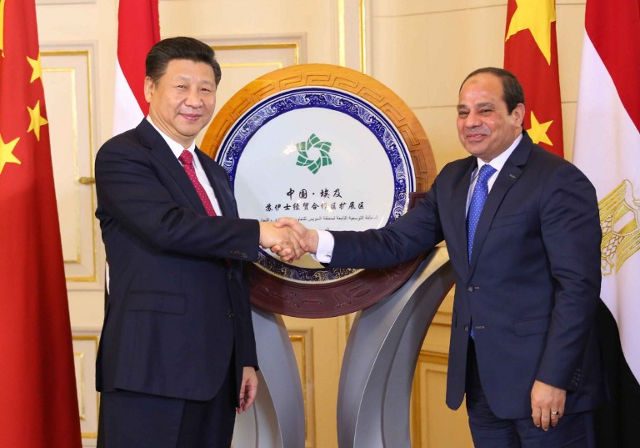SUMMARY
This is AI generated summarization, which may have errors. For context, always refer to the full article.

CAIRO, Egypt – Chinese President Xi Jinping signed a slew of multi-billion-dollar deals with Egypt Thursday, January 21, as part of a regional tour aimed at bolstering Beijing’s economic ties and clout in the Middle East.
After arriving late Wednesday from Saudi Arabia, Xi held talks with Egypt’s President Abdel Fattah al-Sisi and was to address the Cairo-based Arab League.
State television broadcasted the live signing of bilateral agreements at a presidential palace in Cairo in the presence of the two leaders.
“The two sides have agreed to undertake 15 projects… mainly in sectors like electricity, transportation and infrastructure,” Xi said in a joint statement with Sisi.
“The total investments in these projects would be $15 billion (13.8 billion euros). These projects will offer a new impetus to the economic development of Egypt.”
Sisi said the agreements were the “best evidence of the two countries’ determination to improve their levels of cooperation.”
In an article in state-run newspaper Al-Ahram ahead of his visit, Xi expressed China’s backing for Egypt running its affairs without outside interference.
“China supports the people of Egypt in making independent choices for the future of their own country,” he wrote.
He also said China supported Egypt “playing an active role in regional and international affairs”.
Xi’s regional tour, his first to the Middle East as president, will take him next to Iran.
Beijing has long taken a backseat to other diplomatic players in the Middle East but analysts say the region is crucial to Xi’s signature foreign policy initiative – known as “One Belt One Road” – touted as a revival of ancient Silk Road trade routes.
China, the world’s second-largest economy, also relies heavily on oil and gas imported from the energy-rich Middle East.
Xi’s visit to Egypt comes just ahead of the January 25 anniversary of the 2011 revolution that toppled longtime Egyptian autocrat Hosni Mubarak.
Mubarak’s ouster was followed by unrest and a military overthrow of his Islamist successor Mohamed Morsi, the country’s first freely elected president, by then-army chief Sisi.
Saudi-Iran row
As well as addressing the Arab League, Xi was to visit Egypt’s newly convened parliament, which was sworn in earlier this month after elections dominated by pro-government candidates.
He was to also visit the famed temple city of Luxor later Thursday to attend celebrations marking six decades of diplomatic relations between Cairo and Beijing.
His visit to Luxor is also seen as an attempt to lure Chinese tourists to Egypt, whose economy is heavily dependant on revenues from the tourism sector.
In Saudi Arabia, Xi met with King Salman and oversaw the opening of a joint-venture oil refinery in the Yanbu Industrial City on the Red Sea.
Saudi Arabia is China’s biggest global supplier of crude.
Few details have emerged of Xi’s talks with leaders in Riyadh but late on Wednesday the Saudi Press Agency reported that the two countries decided to establish a “comprehensive strategic partnership”.
During his visit to Riyadh, Xi had been expected to seek to ease tensions between Saudi Arabia, the region’s main Sunni power, and Shiite rival Iran.
Saudi Arabia and a number of its Sunni Arab allies broke diplomatic ties with Tehran earlier this month after protesters angry over Riyadh’s execution of a prominent Shiite cleric ransacked Saudi diplomatic missions in Iran.
Iran and Saudi Arabia back opposing sides in a range of Middle East conflicts, including in Syria and Yemen, and there are fears the row could derail diplomatic efforts to resolve them.
Xi was expected Friday in Iran, just days after sanctions were lifted when Tehran implemented its historic nuclear deal with world powers.
China, with the United States, Britain, France, Germany and Russia, was among the countries that reached the agreement with Iran in July to curtail its nuclear activities in exchange for ending international sanctions. – Jay Deshmukh, AFP/Rappler.com
Add a comment
How does this make you feel?
There are no comments yet. Add your comment to start the conversation.